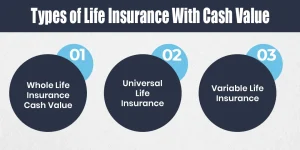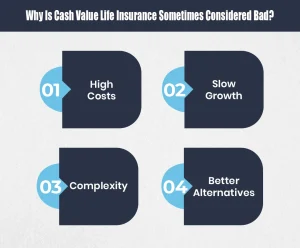Cash Value Life Insurance: A Complete Guide
Key Takeaways
- Cash value policies combine insurance with savings.
- They’re more expensive than term policies.
- Useful for estate planning and long-term wealth building.
- Not always the best choice for short-term or budget-conscious needs.
Life insurance is a smart way to protect your family’s finances, but not every policy works the same. One type you may hear about is cash value life insurance. This type of policy is different because it gives you two things: a death benefit for your loved ones and a savings feature that grows over time.
Still, this type of policy is not right for everyone. In this article, we will explain what cash value life insurance is, how it works, what “Cash surrender value of life insurance” means, and whether these policies are really worth it compared to simpler life insurance options.
Table of Contents
ToggleWhat Is Cash Value Life Insurance?
Cash value life insurance is a type of life insurance that lasts your whole life. It has two parts. The first part is Death Benefit, it means that you family will get the money when you pass away. The second part is Cash Value, it means that the there is saving account inside your policy that will grow over time without any tax
When you pay your monthly premium, part of it goes to keep the insurance active, and the rest goes into the cash value. The cash value will build interest and it also grows. Later, you can borrow from it, take some money out, or even use it to help pay your premiums.
Types of Life Insurance With Cash Value
There are so many types of cash value life insurance, and for the better understanding of which one is right for you lets have a look at all these types.
Whole Life Insurance Cash Value
Whole life insurance will give you coverage for your entire life. You have to pay the monthly payments to keep you policy active, and these payments will stay the same.
The monthly payments you make will also stay the same, and the cash value inside the policy grows over time. This type of life insurance policy is best for people who want something predictable and reliable without any future surprise charges.
Universal Life Insurance
Universal life insurance lets you adjust how much you pay for your premiums, so sometimes you can pay more or less. You can also change the death benefit if your needs change over time. The cash value grows based on interest rates, which means it can increase when rates go up or grow more slowly when rates go down. This type of policy is a good choice for people who want flexibility instead of fixed rules.
Variable Life Insurance
Variable life insurance works differently because the cash value can be invested in different accounts, like mutual funds. If those investments do well, your cash value can grow faster. However, if the investments are not doing well then the value can also go down. This makes it a better option for people who are comfortable with investing and willing to take some risk for the chance of higher returns.
How Much Does Life Isurance Cost?

How Does the Cash Value Work?
Many people ask about that how the cash value policy work and what we have to do, to answer these things lets have a look at the details of working of this policy plan
Premium Split
When you pay for your life insurance, the part of the money will cover the cost of insurance, and the other part goes into a savings account inside the policy.
Growth
The money in that savings account slowly grows over time. It can also earn interest or investment returns, depending on the type of policy.
Access
You can use this saved money later in future. You can borrow from it, take some out, or even use it to pay your future monthly premiums.
Key Points to Remember
A whole life insurance policy gives you two benefits at the same time, it provides a death benefit for your loved ones and also builds cash value that grows over the time, and you can borrow from it or withdraw money if you need it. Since it offers both insurance and savings, it usually costs more than term life insurance. The good part is that the cash value grows is tax free, which means you don’t have to pay taxes on it until you take the money out.
Pros and Cons of Cash Value Life Insurance
To help you decide that if its a good fit for your family or not, here’s a clear breakdown:
| Pros | Cons |
| Provides lifetime coverage | Much more expensive than term life insurance |
| Builds savings that can be borrowed against | Cash value grows slowly in early years |
| Tax-deferred growth of cash value | Loans/withdrawals reduce death benefit |
| Option to surrender policy and take cash | Fees and surrender charges can be high |
| Good for estate planning and wealth transfer | May not be the best choice for most families |
Does Term Life Insurance Have a Cash Value?
Term life insurance only gives protection. If the person with the policy dies during the term, the family will get the payout. But once that fix time ends, the coverage stops, and there is no savings or money left over. That is why term life insurance usually costs much less than policies that also build cash value.
How to Calculate the Cash Value
Most insurance companies offer online tools like a cash value life insurance calculator or a whole life insurance cash value calculator. These tools help you estimate how much the savings part of your policy might grow over time. They usually take into account things like:
- How many years the policy has been active
- The premiums you pay
- Interest or investment growth
- Policy fees
Why Is Cash Value Life Insurance Sometimes Considered Bad?
Some people say that cash value life insurance, like whole life, is often sold too much and not always the best choice. The main reasons are:
- High Costs: The premiums are much more expensive as compared to the term life insurance.
- Slow Growth: the plan will take so many years before the cash value becomes meaningful.
- Complexity: The fees and rules can be confusing, and many people don’t fully understand how this plan really works.
- Better Alternatives: For many families, it may be smarter to buy a term life policy for protection and invest the extra money in a retirement account, which could grow faster.

Final Thoughts
Cash value life insurance combines lifelong protection with savings but comes at a higher cost. It’s best for those people who want permanent coverage, and also who can manage higher premiums. But before deciding, you have to make sure that you have compare it with the other options that are available, because for the so many families term life is more affordable and a good option. But comparing it with a people who want long term financial planning will go for the cash value life insurance. Whatever you are buying make sure that it will cover your family and fit into your budget.
Ready to protect your family and build financial security? Get a free quote from Insure Guardian today and find the life insurance plan that fits your needs and budget.
FAQS
1. How does the cash value life insurance work?
Cash value life insurance splits your premium. One part pays for insurance, and the other part goes into a savings account inside the policy. This savings (cash value) grows over time, and you can borrow from it, withdraw money, or use it to pay premiums.
2. What is the cash value of a $100,000 life insurance policy?
It depends on the policy type, premiums paid, interest, and fees. A $100,000 policy’s death benefit stays the same, but the cash value builds slowly and usually takes years before becoming significant.
3. What is the disadvantage of cash value life insurance?
The biggest drawbacks of cash value plan is that it has higher premiums, slow cash value growth in the early years, and also there are some difficult rules or fees that so many people don’t fully understand.
4. What is the total cash value in life insurance?
The total cash value is the amount of money that has built up in your policy’s savings portion. This is the amount you can borrow against, withdraw, or use for premiums, but surrender charges or loans may reduce it.

Expert Life Insurance Agent and health insurance agent
Dylan is your go-to guy for life and health insurance at InsureGuardian. He’s helped over 2,500 clients just like you figure out the best insurance plans for their needs. Before joining us, Dylan was sharing his expertise on TV with Global News and making a difference with various charities focused on health. He’s not just about selling insurance; he’s passionate about making sure you’re covered for whatever life throws your way.
